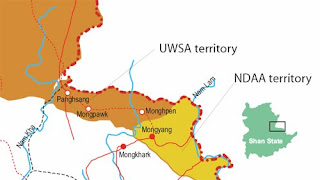N Korea Using Malaysian Bank for Burmese Weapons Deals: Yonhap
By ARKAR MOE
The Irrawaddy News
North Korea sought payment through a bank in Malaysia for a suspected shipment of weapons to Burma being carried on a freighter tracked by the US Navy, according to a source quoted by South Korea’s Yonhap news agency.
Yonhap reported on Saturday that the source said a US envoy would visit Malaysia this weekend to focus on ways to cut off the payment to North Korean leader Kim Jong-il.
“Kim will have a hard time collecting his money,” said the high-level source.
The revelation comes as the North Korean freighter Kang Nam 1 is apparently returning home after being tracked by a US Navy destroyer that suspected it of carrying cargo banned under UN Security Council Resolution 1874, which toughened sanctions imposed after North Korea conducted its first nuclear test in 2006.
Philip Goldberg, the US coordinator for the implementation of the resolution, which was passed on June 12 to punish North Korea for its May 25 nuclear test, is scheduled to arrive in Malaysia on Sunday. Goldberg is in China ahead of his visit to Malaysia.
The White House said that US President Barack Obama discussed North Korea and financial regulations with Malaysia’s Prime Minister Najib Razakon by phone late last month.
According to another source in Seoul, the Kang Nam 1 is believed to be carrying small Soviet-era arms such as AK-47 rifles and RPG-7 anti-tank launchers manufactured in North Korea.
Adm Gary Roughead, the chief of US Naval operations, told reporters on Saturday that the Kang Nam 1 was being closely watched and is now in the East China Sea.
“I believe we are seeing the effects of the UN Security Council resolution,” he said.
On Friday, South Korean news channel YTN quoted an unidentified diplomatic official as saying that Burma requested that the Kang Nam 1 turn around.
The US State Department announced on Tuesday that it had frozen the US assets of Namchongang Trading Corp and Iran-based Hong Kong Electronics to curtail North Korea’s ability to trade in missiles and nuclear materials. Namchongang Trading Corp is allegedly connected to the Burmese arms industry.













